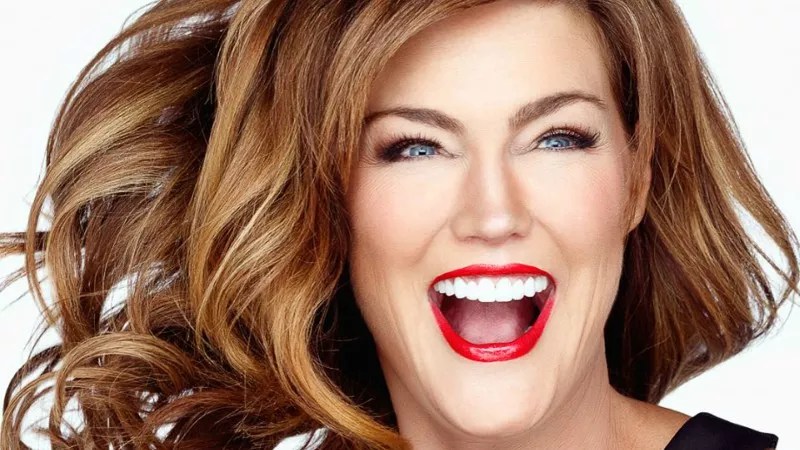
Tommy Collier

Audio By Carbonatix
Denise Plante has slowly but steadily won the media game in Denver.
Plante is among the small handful of local personalities to have regular gigs on both Denver radio and TV thanks to her long-running gig at KOSI 101 and her hosting duties on Colorado and Company, a lifestyle-and-advertising hybrid that airs weekdays on 9News. She’s also a master of social media who’s learned how to spread her brand far and wide and a regular presence at high-profile charity events.
One of Plante’s undeniable skills is to make the listener or viewer feel as if they know her. But in the following in-depth Q&A, she goes into details about her life and career that may come as a surprise to even some of her biggest fans.
In addition to recapping her unlikely rise from small-town Arizona radio enthusiast to decades of success on the Mile High City airwaves, Plante offers anecdotes about her family: Mike Plante, her husband of 27 years, and sons Austin and Wyatt, who are both in their teens. She also discusses what she calls “the hardest time in my life,” when she learned circa 2011 that twenty-plus small magnets ingested by Wyatt were tearing his intestines apart from the inside. To make matters worse, her decision to post about what was happening in order to warn other parents about the dangers of the items prompted a series of online troll attacks that compounded her trauma.
Not that this experience has made Plante shy about sharing her experiences if she thinks they’ll help others. She talks frankly about taking medication for anxiety in the context of touting a new campaign that attempts to destigmatize matters of mental health.
Continue to get to know Denise Plante a whole lot better.

Denise Plante at one of her early radio gigs.
Courtesy of Denise Plante
Westword: Where are you from originally?
Denise Plante: I’m originally from California, but my dad retired at a young age – he retired when he was 42 – and we moved from California to Lake Havasu City, Arizona, when I was twelve years old. That’s where I got my first radio job, at Hot 101 in Lake Havasu.
How did you first get interested in radio? Was there a class in radio at one of your schools, or were you just a radio fan?
I’m going to date myself, but do you remember the days when you would wait by your radio for your request and then you’d record it on a cassette and you’d have the sound? I used to do that. I’ve always been a fan of music, and I always thought it would be a fun job. But my main goal in the beginning was TV, because at my high school, Lake Havasu High School, we were the Fighting Knights, so we had a show called Knight Life News. I got into journalism, and I would do the announcements – and once a week, we would have high school news that we would stream on local TV.
So my goal was to get into broadcasting, but Lake Havasu, which is between Las Vegas and Phoenix, didn’t have a TV station. That’s when my parents said, “You should get into radio.” Now, you’re going to laugh at this, because it’s so embarrassing, but I thought the more talent I could show the owner of the radio station, the more he would want to hire me. I thought I could show him different subjects I could talk about. So I brought in a VCR tape, and it had me singing in the talent show – so I could talk about singing! It showed me running hurdles – I could talk about sports! I thought, he’s going to think I’m so relevant and will be able to talk about all sorts of things on his radio station!
What was the expression on his face as he sat there watching this with you?
He had a really good laugh! The station was so small; he was the owner, the program director and the morning-show host. And he liked my enthusiasm. He said, “Listen, I don’t have anything right now, but if I do, I will contact you.” I just didn’t understand why he didn’t hire me right then. To me, that all made sense, because I was eighteen years old.
After that, I went to UNLV for a semester, and I came back during the summer, and the town was so small that people came into the grocery store where I was working and said, “Denise, the radio station is asking if anybody has your number and to contact them.” The owner didn’t know how to get in touch with me, so he was broadcasting it over the radio station.
I reached out to him, and he had a job pushing buttons. I was pushing buttons for Rick Dees’s Top 40 countdown. And when an opportunity opened at night, I marched into the owner’s office – I’d turned nineteen by then – and said, “Give me a shot. I can do this. Let me get on the air.” And he gave me a shot. Then, when afternoons opened, I went back and said, “I can do this, too. Give me a shot.” And I got an afternoon show. This was 1992, and it was a Top 40 station – KBBC.
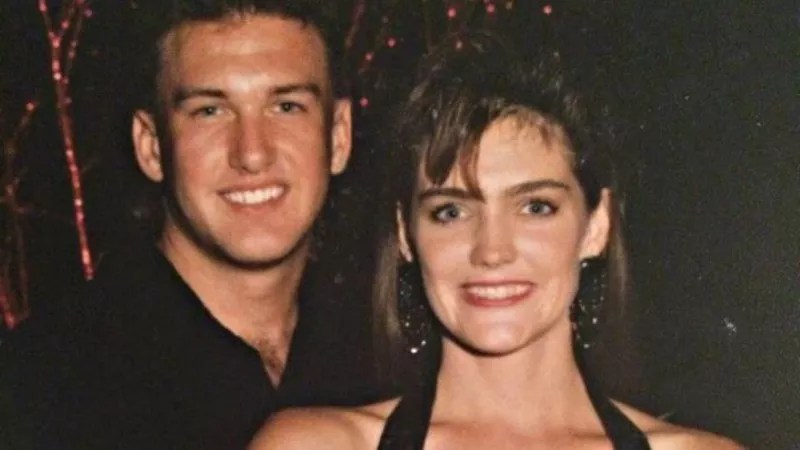
Denise and Michael Plante in 1993, at ages nineteen and twenty, respectively.
What kind of music do you remember playing on the station?
Did you see Salt-N-Pepa on the Billboard Music Awards? Well, that was the stuff I was playing. “Push it real good!” [Laughs.] I played En Vogue, Vanilla Ice, C+C Music Factory. The music director mixed a lot of stuff in. There wasn’t a lot of grunge, but we played MC Hammer and a lot of Alanis Morissette.
One of the fun things about working there is that Lake Havasu City is a resort town, and during spring break, MTV came out, and one of my jobs was to drive a boat or a Sea-Doo out to Copper Canyon and interview the stars through a telephone; they could put the telephone live on the air. So that’s how I got my foot in the door doing a little work with MTV. It was just a fun opportunity. This was probably ’93, ’94. I did a couple of shows for them then, and after I came to Denver, I had the chance to work with them again, voicing a program where you would hear a jock on the air and I would do voiceover. I think it was called FM Nation.
After that, I did mornings at a country station in Bullhead City, Arizona – that’s another small town. And by then, I’d already met my husband, Mike, who’s from Greeley. I met him when I was nineteen, in Lake Havasu. He’s done this whole crazy ride with me. Then we moved to Phoenix, and I worked a little out there.
We didn’t have any kids at that point, so we thought, “Let’s move to Colorado.” I had family in Colorado, too, so one day, we packed up the car and drove there. No jobs, no nothing. But we got jobs and started going at it here.
We drove to Greeley and surprised Mike’s mom. She didn’t even know we were coming. I’d never had the opportunity to drive in snow, and I was scared: This was a girl who lived in a place where it got to be 120 degrees. Then, once we were in Greeley, I looked up the nearest radio station, and it was TRI 102.5 in Windsor. I worked there for a couple of months, and I was starting to put a package together for Denver when Ron Harrell from KIMN called me on the request line and asked if we could meet, because he was interested in hiring me. He drove to Greeley and we met, and after that, I took a job working evenings at KIMN.
He must have been impressed to drive all the way to Greeley for an interview. What was it about your style on the radio that appealed to him so much?
I remember him saying he liked me being upbeat – my personality – and I worked a lot of entertainment into the show.
It was such a blessing – almost like God working in a mysterious way. I’m very spiritual; I have strong faith. I was just getting my package together to send to stations in Denver, because my husband was already working there, and here’s a job coming to me on the request line.
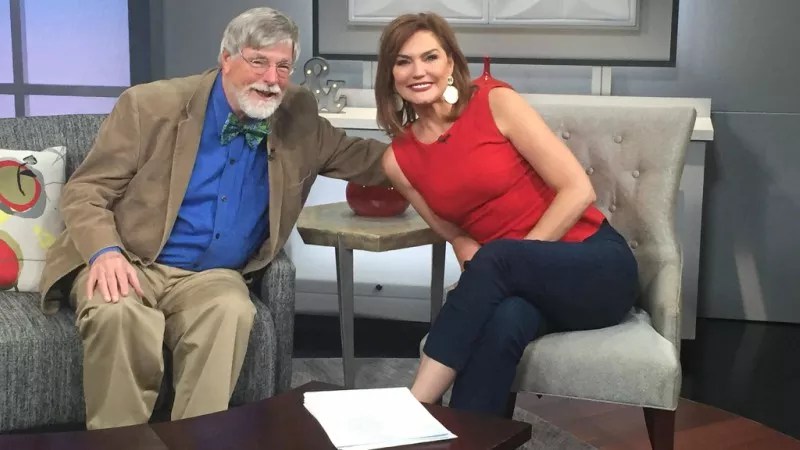
Denise Plante with Tom “Dr. Colorado” Noel on the set of Colorado and Company.
How would you describe your job at KIMN?
It was wonderful. It was great. I really enjoyed it. It was KIMN when I first started there, and then it moved over to Mix 100.3. I worked evenings, and then I worked mid-days for a while. Then, in ’99, I got pregnant with my oldest, Austin, and my plan was to come back to work. But this baby changed my whole life. I thought, I just want to stay home and be with my son. So I quit work, and my husband took a job in Missouri – my brother lived out there – and we thought, okay, we’ll move to a small town. That lasted four months.
Why such a short a period of time?
I was so bored! I went to Walmart one day and bought every candle they had, I was so bored. [Laughs.] I had no friends, but I was in the best shape of my life, because I’d go jogging every day with my son in the stroller.
Small-town life wasn’t something you wanted to return to?
Not at that point in my life, and not now in my life. Eventually, maybe, down the road. But I realized one thing: I wanted to continue working. I wanted to be a mom and be there with my kids, but I also wanted to have enough time to accomplish what I wanted to do in life. So we moved back to the Denver area – we live in Castle Rock – and I started working at Alice. I did afternoons there for a long time.
Did you have that job lined up before you headed back to Denver?
No, we just moved. My husband took his old job back – he operated heavy equipment, he worked for the union – and I didn’t have to worry about anything; everything was set. But I realized I wanted to work at least part-time. So I started working part-time there, and it’s funny how things come full circle in life: My current program director, Jim Lawson, was the person who hired me at Alice. That was…seventeen years ago?
They allowed me to bring Austin into the studio. I put up a baby gate, and in between songs, I would color with Austin. It was fun, and then it got to the point where my husband would get home from work and I would give him Austin and I’d be able to head into work.
About what age was Austin when he was no longer able to color quietly while the microphones were on?
That’s about any age [laughs]. But the wonderful thing about it was how supportive they were. Jim knew we were targeting women, and women thought it was cool that I was able to bring my son in, and every once in a while, they could hear Austin in the background. But I was more concerned about Austin being at the radio station, thinking he should be at home and comfortable with his dad. And we were able to work that out with our schedules with both our kids, so we were always able to do the hand-off. One parent was always there. That was a big blessing, I think.
So it wasn’t that there were some people at Alice who were bad influences?
No! [Laughs.] I actually had a sign that said “Baby in Studio” before they opened the door. But everybody who worked there was always really kind and respectful. I don’t have one negative thing to say about it.
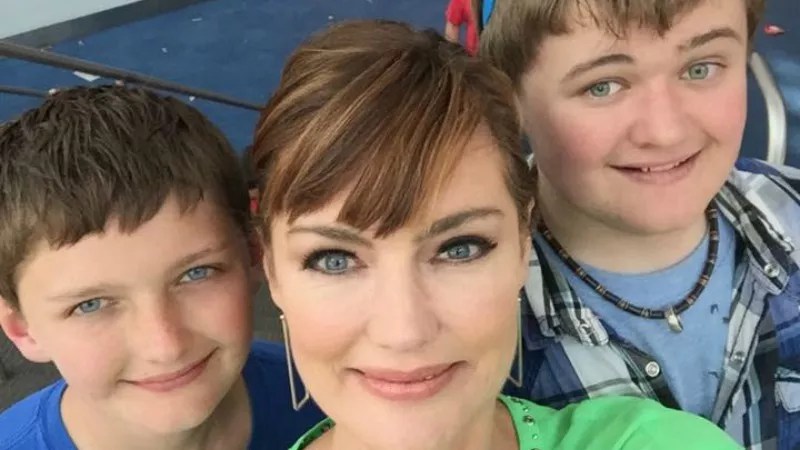
Denise Plante with sons Wyatt and Austin in a 2015 photo.
Where did you go from Alice?
Our sister station, KOSI, was in the same building, and I had an opportunity to go over and work mid-days at KOSI, and that fit my lifestyle a little bit better. With a younger son, I wanted to be at home at a different hour. KOSI’s always been a great fit. I was a busy, young, active mom juggling the kids, but I still loved the music. It’s a perfect utility in my life. So I’ve been here for fifteen years, almost sixteen.
When did you move to the mornings with Murphy?
Let me see – Wyatt was born in 2003, so I’m thinking 2005. I worked that for about ten years, and I’ve been back at mid-days now for about three years. So Murphy and I worked together for a good, solid ten years in the mornings. It was fun.
Along the way, you started doing Colorado and Company, too.
That’s been going strong for fifteen years. Crazy, right? Colorado and Company was pretty much the launching pad of that type of show. 9News realized that with the DVR, people were fast-forwarding through commercials. So it’s a lifestyle show, but it also gives businesses the opportunity to sit down with me for five to seven minutes to talk about their business. It’s my job to make it interesting so people actually watch – and they don’t fast-forward through it, like it’s a giant commercial. We’ve been doing great.
I’m guessing a lot of people initially had doubts about the concept. Did you ever have anyone say, “That’s never going to last?”
They never said that to me, but I’m sure it was said in the past, because it had never been done before. It was unique. It was the brainchild of Roger Ogden and Steve Carter. Steve is now running 9News, and Roger is retired. But now this type of show has launched in every market out there, and it’s very successful. Our clients will tune in, and they come back. I think we have a client who’s been on the show for the full fifteen years.
It’s not a ratings-driven program. They don’t really care about the ratings. They just want to make sure our clients get the phone call. Obviously, it’s working well. We have loyal fans. And I’ve built a relationship with a lot of our clients. They know about my family, I know about their family. So you’ll see me posting a lot on social media with pictures of clients from Colorado and Company or clients from KOSI. It cross-promotes perfectly. I have a lot of clients that I’ve been with for a very long time that I endorse over at KOSI and they’re also clients at Colorado and Company.
Even today, when people Google your name, one of the first things that comes up is about your son having three operations because magnets he’d swallowed pierced six holes in his intestines. The story went not only national, but international; one of the biggest articles was in the U.K. Daily Mail. Could you tell me about that experience and what it was like to have a very personal story known all over the world?
That was the hardest time in my life. It took me many years to not feel so guilty about it. I bought those magnets for my son for Christmas, and they didn’t have a warning label. I thought, they can build things. It’ll be fun for the kids. Little did I know that two of those magnets can kill a person, and there were kids putting them on their tongues like tongue rings, so they’re not getting pierced. It just takes two to kill someone.
My son, he got them at Christmas, and in January, he started not feeling good. I took him to the pediatrician, and they thought he was just constipated. I took him a couple of times, and then his birthday rolled around on the 23rd, and he wasn’t excited about it. So I said, “Let’s take him to the emergency room.” They said the same thing, that he was constipated. But I demanded an X-ray or a CAT scan or something, because I knew there was something going on. And they said, “We’ll give that to you, but we’re telling you, he’s constipated.”
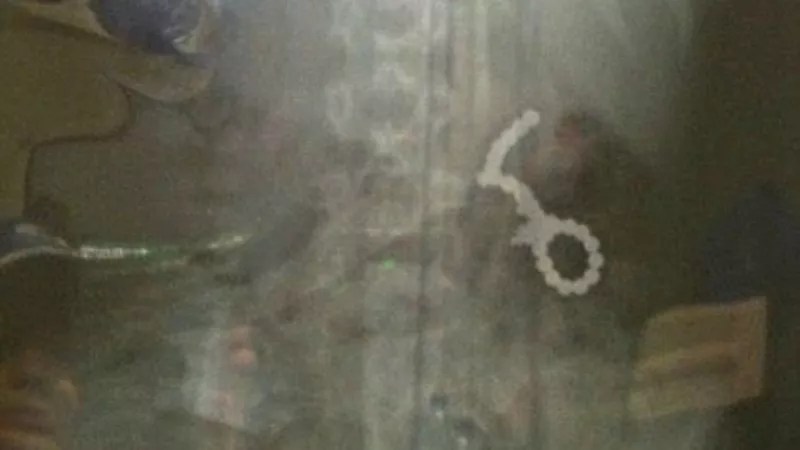
Denise Plante posted this X-ray of her son, Wyatt, on social media. The looped figure on the right of the frame is made up of the magnets her ingested.
They came back with the X-ray that I posted on social media of all the magnets in his intestines. Wyatt never told us. It’s just like a kid: They swallow a marble or something else, and they think it’s going to come out. No big deal.
The people at the emergency room ran in and said, “Did you swallow something metal?” And he’s like, “Oh, yeah.” He made something the size of a marble out of those magnets. There were over twenty-something of them that he swallowed. He put them in his mouth and was just pushing them around and they went down – and he didn’t think anything of it, he didn’t tell us.
Once they found that, they rushed us to Rocky Mountain Hospital for Children, and that’s why I’m so passionate about that hospital and about HealthONE – because they saved my son’s life. He was on a stomach pump and he had over three surgeries; he couldn’t eat for two weeks. Dr. Steven Rothenberg saved his life.
That’s the most difficult thing I’ve ever had to go through in my life, because I thought I was doing a good service. My husband said, “Yeah, post it on social media. Have people tell all their friends, ‘Get this out of your house. It could cause harm'” – and it’s not only if you have kids. It can harm pets, too. So I thought I was doing a good thing, and still, ’til this day, I’m glad I did it. I heard from people who said, “Thank you. We got it out of our house.” But I received so many hateful emails and things on social media.
Of course, they don’t tell you who they are. But they were saying I was a bad mom and how I should have my kids taken away. And I almost had a breakdown because of that. I suffered from anxiety horribly. Here’s my kid laying in a hospital bed, and here are people saying, “You work too much. You don’t care about your kids. You’re a horrible mom. Why don’t you watch your kids?” All this horrible stuff. Still, to this day, it really, really bothers me.
But my son’s happy, my son’s healthy. I dealt with it, and I’m glad I put it out there for other parents so they could get those out of their house. And I’ve had people say, “Because of your message, I threw those away.” Or, “My husband had them on his desk to play with, and we threw them away.”
It’s something people still bring up to me all the time, and for the longest time, I would cry. But you live and learn.
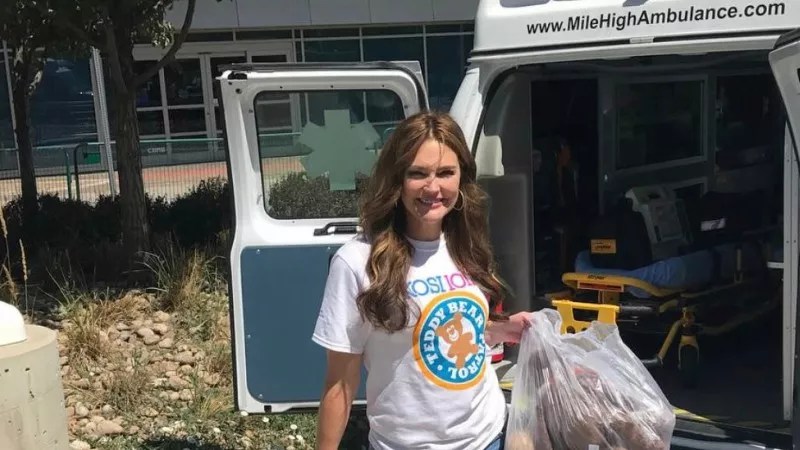
Denise Plante, seen collecting teddy bears for kids, is very active in charity circles.
Courtesy of Denise Plante
How did you get on the other side of that emotionally? How did you get to the point of thinking that telling your story was a good thing, because it helped others?
My husband – I don’t want to sound corny, but he’s my best friend and my biggest champion. He always points out, “You’re a great mom. It didn’t have any warning labels on it. You can’t hold that guilt.” It took a lot of talking, and it took a lot of internalizing and looking at myself. And I do have anxiety. I’ve always had anxiety, and I deal with that. But there are trolls out there, and still, to this day, if they’re not going to say, “You’re a bad mom,” they’re going to say, “I hate your hair.” [Laughs.]
Here’s something funny. I got an email to the TV station that said, “Will you please tell Denise Plante her dumb-girl act is getting old?” I went home, and I was fuming. I was so upset by that. I wasn’t hurt, I was mad. And I said to Mike, “Can you believe that? She said my dumb-girl act’s getting old.” And he looked me right in the eye and said, “You email her back and tell her it’s not an act!” [Laughs.] He puts everything in perspective for me. You learn to laugh those stupid things off.
How would you describe your style on the air at KOSI?
Radio is so much fun. I enjoy it, and I try to be the listeners’ friend. I go through a lot of the things that other women and moms go through. So I think if you can connect on an emotional level, that’s great. I don’t normally talk about things as deep as what we just talked about. I usually talk about funny things. Like the other day, I had to write a check to Comcast with a crayon, because I couldn’t find a pen! I went through the junk drawer and there wasn’t a pen, so I had to use a crayon! I said, “This is stupid. My kids are in their teens now. Why am I writing with a crayon?” That’s silly stuff every mom can relate to.
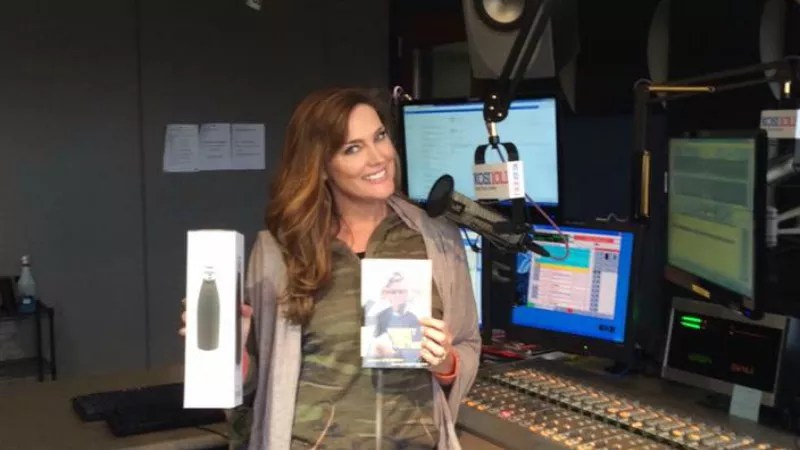
Denise Plante showing off some swag in the KOSI studio.
How do you decide what in your personal life is okay to share and what’s just for your family?
I’m pretty much an open book. Some trips I won’t talk about, especially with today’s social media. You know not to post pictures when you’re out of town, because there are a lot of robbers and crazy people out there. But I’ve been in radio since my kids were born, and they’ve had a lot of perks from radio. My boys have been able to pass the basketball out in a Nuggets game. They’ve been on the stage at the Pepsi Center to introduce a concert. So they know that along with all the perks, there are going to be times when Mom wants to take a picture and say, “This is a cool moment other moms will relate to.” I never do anything that’s embarrassing toward my family, and I know my kids are that age – and my husband is, too! – where they don’t want certain things talked about. So I don’t do that.
I’ve been with Mike for over 27 years, and he’s completely the opposite of the way I am. He’s totally shy. The only time he’s ever been on the radio was when I was starting out in Lake Havasu City. That was back in the time when you recorded everything on a reel-to-reel, and it was a Christmas commercial. I needed him to jingle bells behind me, and he’s jingling the bells and I’m reading, and all of a sudden, I feel this tap on my shoulder. I turn around, and he’s sweating and bright red and giving me the motion to cut it. I stopped the tape and said, “Mike, nobody’s going to know that’s you.” And he said, “I can’t do it! I can’t do it!” So he’s on the opposite side of the spectrum.
In the media landscape today, a lot of people are sounding the death knell for over-the-airwaves radio. What do you think about the future of traditional radio?
I think it’s stronger than ever. Yes, there are other opportunities to listen in different ways – but I think radio right now is at the top of its game. If you do the research, a lot of people in the younger demos, they tune in to listen to us on the radio. We’re number one in women ages 18 to 54. Right there, that tells you we’re relevant in their lives and we’re connecting with them on an emotional level. I think also with the advancement of streaming and having apps and social media, that just helps us. It gives you a peek into what the jock looks like. When I first started, you could only imagine what jocks looked like. You never saw their faces.
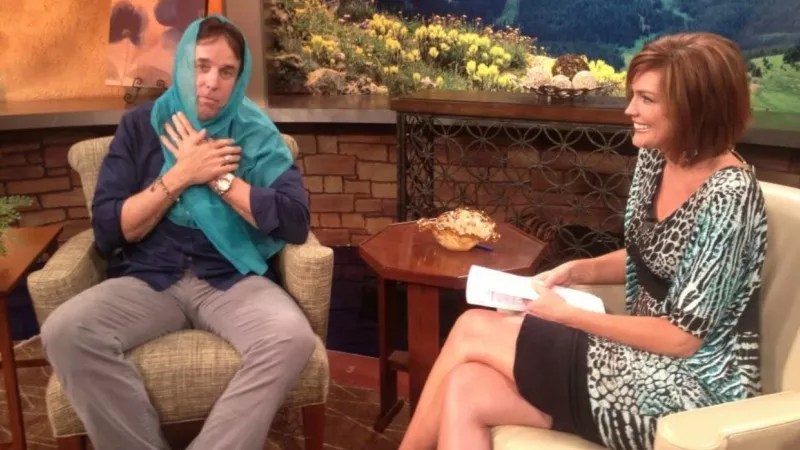
Comedian Kevin Nealon with Denise Plante on the set of Colorado and Company.
Courtesy of Denise Plante
I worked with one guy who was this flamethrower on the air. He was awesome and had a great following. But once he got off the radio, he was very shy, didn’t like to talk in public. So it kind of gives you an inside peek when you stream online with the advancement of the web.
You have a very active social-media presence. You’re always posting things on Twitter and Facebook and Instagram. Is that almost part of the job at this point?
Yes. I enjoy social media. I would do that anyway. As a matter of fact, my kids blocked me on Snapchat!
Why?
Because I was sending them all those silly videos with masks you can put on. My son was like, “Mom, not cool. Leave me alone.” So now I don’t have anyone to Snapchat with, which is really boring. But Instagram, Twitter and Facebook I enjoy. It helps you stay relevant and connected with your listeners. It’s just one more way to do that with your fans and listeners. And I’ve actually become friends with a lot of the listeners on KOSI. They’ll call up to the station, and it’s like we’re on a first-name basis, which is nice.
Is being local a key to that – listeners knowing that you live here, as opposed to being some syndicated voice coming from New York City?
Absolutely. People appreciate knowing that when they turn on the radio in the morning or during the day, I’m going to be able to talk about what’s happening right then. We just had a hailstorm not too long ago. If you’re syndicated, you can’t talk about that. You can’t talk about what’s happening in downtown Denver and some of the events that are going on. I’m very involved in the community, especially in the nonprofit world. So I enjoy being involved locally as opposed to just being a syndicated voice that you can’t really connect with.
Another thing I’m involved with right now is Mental Health Colorado. I’m passionate about getting the word out about what’s happening in Colorado. There are a million people here who have mental illness or substance use disorder, and out of that million, over 200,000 of them are children. And unfortunately, we worry about sending our kids to school these days.
People say, “What are we going to do? We’ve got to make a change.” Well, what should that change be? I recently invited Andrew Romanoff [president and CEO of Mental Health Colorado] to the radio station, and you’ll hear commercials running where I’m encouraging people to log on or reach out to get help if they’re struggling or if they have a family member that’s struggling.
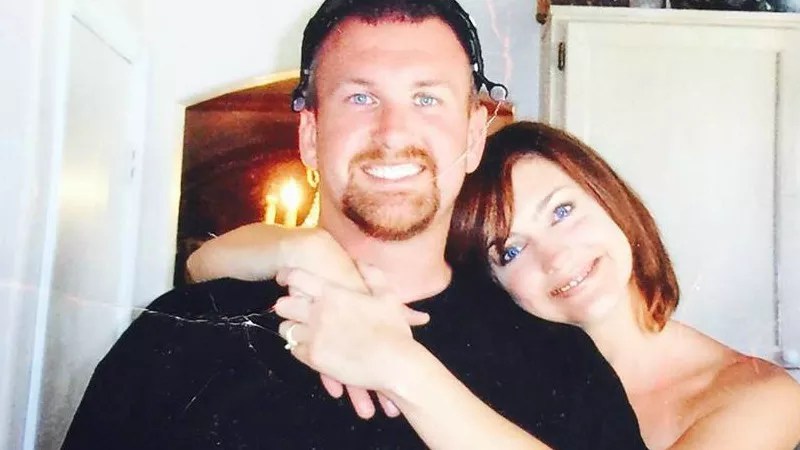
A more recent photo of Denise and Michael Plante.
Suicide rates are very high in Colorado, and I know at high schools in the area, there have been a lot of suicides. I tell my boys, “This is just a blip of your life. There’s so much more out there. I know your’e struggling with issues that seem so big to you now. But just know that a year from now, you’re not going to think about this.”
I think also we need to make it okay if you have anxiety, like I do, or if you have depression or you have OCD or you have suicidal thoughts – to let people know it’s okay to reach out and get help and not be afraid. If you had high blood pressure or some other medical issue like that, you wouldn’t be afraid to take a pill – like, “Okay, I need to take a pill for my high-blood pressure.” But there’s such a stigma around anxiety and depression. You supposedly can’t let anybody know you’re going to take a pill for that. And I think there’s a way for us to break barriers and give people an opportunity to reach out to Mental Health Colorado or the folks over at HealthONE.
It just struck my heart after what happened again in Texas [the recent shooting at Santa Fe High School took ten lives]. I thought, if you could just touch one person and say, “Here’s a website or here’s a phone number if you’re sad right now. Guess what: You have anxiety? Well, I have anxiety, too, and I take medication for it. I’m not embarrassed about it. It helps me. So reach out. You don’t have to live like that.”
If I can reach one person, that’s what life’s about. Life’s not about how much money you have or having great shoes or silly things like that. Life’s about paying it forward and lifting the community and helping others. That’s why I try to stay so involved in nonprofits. I feel like God gave me these two amazing platforms, and if I can help others with those platforms, I’m going to.
For someone who wasn’t initially all that interested in getting into radio, are you happy that’s the direction your career took you?
I am. I’ve had such a fun career so far, I really have. And with radio, as opposed to TV, you can come in with a ball cap and sweats and nobody knows – unless there’s a camera in the studio!